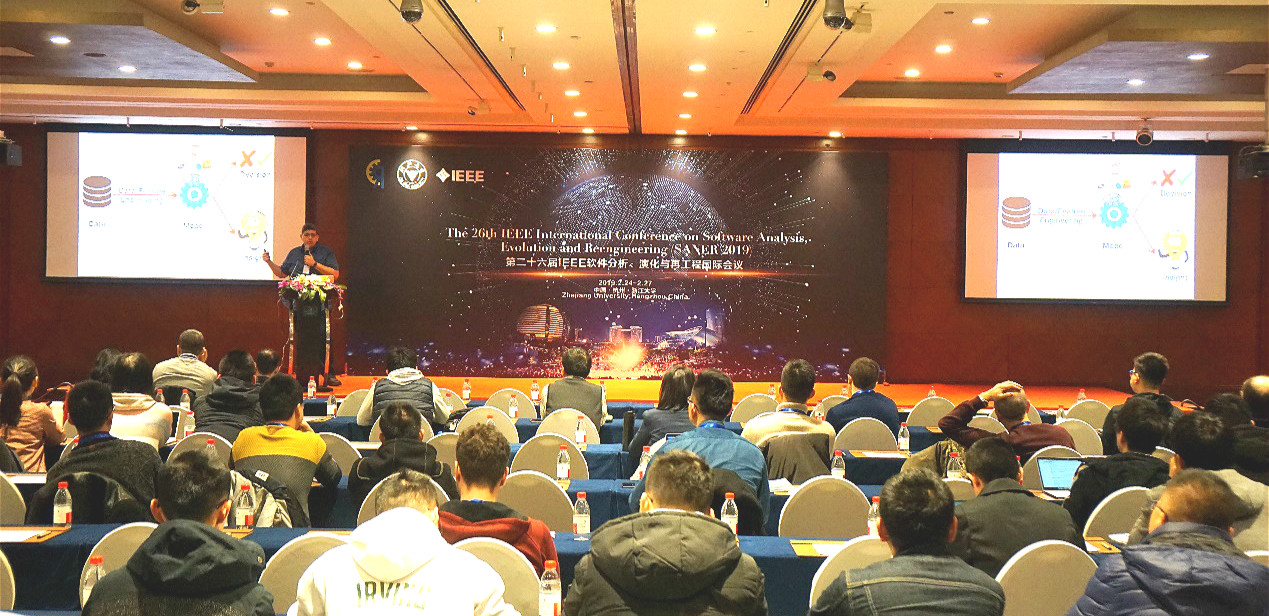The 26th IEEE International Conference on Software Analysis, Evolution and Reengineering (SANER 2019) and related seminars were held in Zhejiang University from February 24th to 27th, 2019. The conference was held by IEEE and hosted by Zhejiang University. Professor Wang Xinyu from the College of Computer Science, Zhejiang University served as the chairman of the conference. Professor David Lo from the Singapore Management University and Professor Emad Shihab from the University of Concordia, Canada served as co-chairs of the program committee. Dr. Xia Xin from Monash University, Australia served as chairman of the organization committee.

SANER is a high-level academic conference recommended by the China Computer Federation (CCF-B) and an authoritative conference in the field of software maintenance. This was the first time that SANER was held in China, and it was also the first time that Zhejiang University held a high-level international academic conference in the field of software engineering. The conference attracted more than 200 experts and scholars in the field of computer engineering from 26 countries around the world to participate in academic exchanges and discussions on software analysis, evolution and re-engineering in the era of cloud computing and big data. The conference included featured reports, Ph.D. forums, group paper reports, industrial forums, Asia-Pacific forums, poster presentations, tool demonstrations, etc.

Professor Ahmed E. Hassan (IEEE Fellow) of Queen's University of Canada was invited to give a keynote speech entitled Software Engineering in a Data Science Future; Professor Jon Whittle, Dean of the School of Information Technology at Monash University was invited to give a keynote speech entitled “Does your software value what you value?”; Professor Jin Zhi from Peking University was invited to give a keynote speech entitled “Forward and Backward Traceability: Requirements and Challenges”.

In addition, international seminars such as the Asia-Pacific Software Engineering Forum, software cloning, intelligent defect remediation, AI-based mobile application analytics, blockchain technology for software security and analytics were also held at the same location. Participants conducted extensive and in-depth discussions on the development status and trends of software analysis, evolution and re-engineering technologies in the era of cloud computing and big data. Participants from domestic and foreign companies such as Huawei also actively participated in relevant academic exchanges and discussions, jointly exploring the road of technology transfer and cooperation development with the academic community.
The conference was planned and organized by the software engineering research team of Zhejiang University. The main research directions of the team are intelligent software engineering, cloud computing and edge computing, blockchain and real-time big data analysis technology. In recent years, the team has achieved fruitful results in software engineering research, publishing more than 110 high-level papers (including 18 CCF-A papers) and winning two Outstanding Paper awards at top conferences. It has established close cooperative relations with many well-known universities and formed an efficient talent training mechanism. In terms of industrial applications, the cooperation between the software engineering team and many companies in the financial field has also achieved prolific results, which had important impact on promoting the development of China's software industry and the global open source community.







